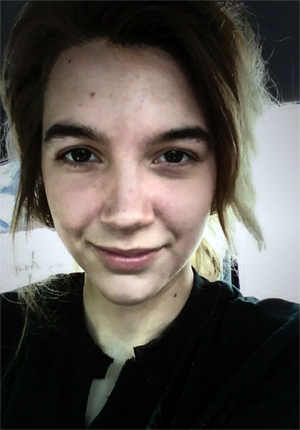
Ever since I was a child, I felt different, too emotional for my own good. When I was fourteen, the feelings became too much, and my doctor prescribed an antidepressant. At seventeen, I was hospitalized for having delusional thoughts and hurting myself. It felt like I hadn’t slept in weeks, and the most terrifying thing in the world was happening. I was watching myself go crazy; snapping in and out of it like my brain was pulling some sort of cruel joke on me. Bipolar disorder was so difficult to understand. What did this mean? Was I going to be this way forever? I felt branded; ashamed of who I was, unable to picture a successful future for myself.
After I accepted my diagnosis, I suddenly found bipolar disorder to be part of my identity, even as a well-kept secret hidden from most friends and family. However, it made me creative and artistic. It made me see the world from a million different perspectives, depending on whatever mood decided to take control. In that process, I lost myself, or at least the person I wanted to be. I gave my mental health condition all the power and decided to use, “I’m bipolar,” as an explanation to myself.
My dream of becoming a scientist had fallen by the wayside, but this time I recognized I needed help. As soon as I worked up the courage to try to get better, I realized life did not have to be so hard. At twenty years old, I’ve confided in others and, to my surprise, have received immense support and acceptance. I’ve learned to never underestimate the love and selflessness of people. I’ve found the gumption to go back to school for biology with a neuroscience concentration. Maybe I can become an expert on the brain, and someday find a better treatment, or even a cure for bipolar disorder.
Another thing that helps me immensely is writing everything down. Now, when I feel an episode coming on, when I feel like I am going down the wrong path, I try to recognize those feelings, know that they are only feelings, and write them down. It helps me think more logically, even when my body is screaming at me to think otherwise. Also, I try not to let my health fall by the wayside. Therapy, effective medications, exercise, pets, and healthy eating have been important factors in my recovery.
Lastly, I try not to describe myself as a bipolar person. I have bipolar disorder—a chemical imbalance in my brain. It doesn’t make me who I am. I am who I choose to be. I keep on the right path by remembering that the most important things in life are not fleeting, and also by the support of friends and family. Being honest about the way I feel, accepting and loving myself, living healthily, and being determined to get help have gotten me this far.


